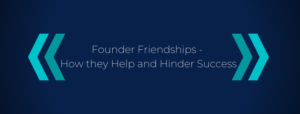
By Vanessa Cox
“Friends for a reason, friends for a season, friends for a lifetime”
1.It’s all about CLARITY OF ROLES: At any stage (start-up, scale – up or maturing organization), co-founders benefit when they are “friends for a reason” or even “friends for a season” as emotions get less in the way of good business sense. This requires clarity around roles & responsibilities coupled with clarity around “what success looks like” and what contribution each makes to the whole. Importantly, here the dual “hats” (one being the founder/shareholder hat and one being the executive role hat) come into play. Again, clarity around which hat each founder is wearing in a discussion is vital. Sometimes, in fact quite often, friends part ways (it’s the end of the season) and it is paramount for business success that these decisions are taken jointly, through transparent discussion, and then explained carefully to the organisation. Bringing new Leaders into the organisation that are “better than us” may be the catalyst moment sparking these sorts of conversations. All too often, they happen too late and with a high degree of acrimonious noise, which distracts the organisation from its growth path. This needs to be avoided at all cost.
2.TALK, TALK, TALK: Co-founding a business takes friends from “friends for life” to “friends for a reason” status. It’s a moving dynamic that is best monitored with an open dialogue about the emotional toll this is having on the friendship. Courage to be open and transparent about financial and personal situations is paramount as decisions on shareholding and role allocation happen. As the organisation evolves, constructive and constant feedback to each other strengthens the bond of trust, allowing for better people and business decisions and “line of one” communication to all stakeholders.
3.Friendship is a GIFT: Over time, leadership requires increasing selflessness and compromise. It can be lonely at the top. Here finding a way back to the “friends for life” relationship, over and above the business context, will help our Founder Duo. If they have managed to move back to “friends for life” mode, they will have the most trusted Thinking Partner by their side, helping them see what is needed to ensure sustainable business success and make the right decisions. Even if they parted company along the way, they may even choose to collaborate again when the next big idea comes across their paths.
4.Bring in a COACH: Having an external expert person supporting and facilitating these incredibly personal courageous conversations, providing the frameworks for effective dialogue and helping the Duo shift perspective, ensures a commitment to yourselves and sets a high value to the bond of friendship you have.
In summary, navigating your interpersonal relationship as founders is critical for the success of your business. Investing in time and space to have these all important conversations will benefit you, your business and all your stakeholder relationships. AND, you get to keep a friend!
Many people will walk in and out of your life, but only true friends will leave footprints in your heart. -Eleanor Roosevelt
Link to the CBI Study: Click here
Our Key Insights from Coaching this Month
Over the past few months, discussions about generational gaps have come up through my network, mainly related to the (real or perceived) lack of commitment of young new recruits. Generation X managers – of which I was a part – often feel helpless and are unsure how to cope with their new requests: more flexibility at work, more autonomy and trust in the individual contributions etc… It’s like the old world had collided with a new one, and we find ourselves in new territories.
From my perspective, businesses should now evolve urgently or they may eventually disappear for lack of commitment. And the more complex, global, ambiguous and uncertain the organization, the more essential it is for teams to contribute – together – in a real human adventure.
I share these thoughts with you after reading Peter Senge’s book “The 5th discipline”. Senge says that when it comes to the team, it is about developing a set of skills like personal mastery, shared global vision, understanding of mental patterns, the ability to learn as a team and system. Knowing how to manage today’s teams, in the midst of this new wave of big transformation requires a new skill set.
As organizations, and society engage with Diversity, Equity and Inclusion, we are now faced with a related strategic question: how do Neurodiverse leaders fit (or not fit) our model of organizational leadership? How can organizations embrace the unquestionable talents these people bring, but also what do Neurodiverse leaders need to understand about their ways working and how they impact others? Do career paths need to evolve?
We also need to consider our role as Executive Coaches as we support Neurodiverse leaders and management teams. What coaching strategies do we need to focus on? What new tools may be needed to supplement our repertoire? How do we steer clear of diagnosis or therapy while also embracing the whole person?